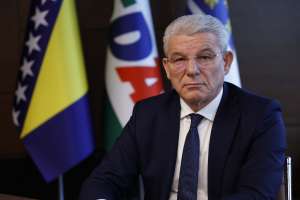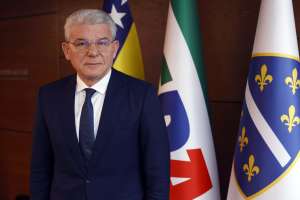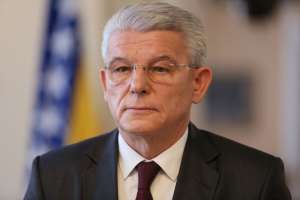NEW YORK, July 10 (FENA) - Chairman of the Presidency of Bosnia and Herzegovina Šefik Džaferović addressed today an extended session of the United Nations Security Council on the occasion of the marking of the 25th anniversary of the genocide in Srebrenica.
The Permanent Mission of Bosnia and Herzegovina to the United Nations, in cooperation with the Permanent Missions of Germany, the European Union, France, Belgium, Estonia, the United Kingdom and the Netherlands, organized a High Level Commemoration on the occasion of the 25th anniversary of the Srebrenica genocide. The meeting was moderated by the incumbent Chairman of the United Nations Security Council, Christoph Heusgen.
Chairman Džaferović's address follows below in its entirety:
Distinguished Chairpersons, Your Excellencies, Ladies and Gentlemen,
I thank you for the invitation to address you on the occasion of the 25th anniversary of the genocide in Srebrenica, a former United Nations Safe Area.
The Srebrenica genocide is the greatest crime committed on European soil since World War II. By its scale and monstrous forms of execution, this crime has left deep wounds that have not yet healed.
More than eight thousand people were murdered within the span of a few days. Their bodies were taken by trucks to different locations where they were buried in mass graves. Some of them were buried alive. Some were underage boys, ruthlessly taken from their mothers, in front of the gates of the Dutch Battalion base of the UN forces in Potočari.
The men and boys from Srebrenica were murdered with their hands tied with wire, while they stood helplessly in front of the firing squads of the Army of the Republika Srpska.
To hide the evidence, these war criminals later dug up the bodies from mass graves, and moved them to secondary and then to tertiary mass graves. It was a terrifying industry of death, devoid of any mercy, compassion, and respect for human beings. It was genocide in its full sense.
Although its most intensive part took place in a span of a couple of days in July 1995, the genocide in Srebrenica must not be limited to that short period of time. The days after the fall of Srebrenica were only the end of the genocidal process that began with the massacres in 1992, and continued with the years-long siege of the Srebrenica enclave and the terrorizing of its population. That is why the Security Council declared it a United Nations Safe Area in 1993, two years before its final fall.
Not only people from Srebrenica were killed in Srebrenica. In Srebrenica, Bosniaks from the entire area of eastern Bosnia, Zvornik, Bratunac, Vlasenica, Milići and other places, were also killed. Fleeing mass persecution, they all took refuge in the Srebrenica enclave.
Ladies and Gentlemen,
The genocide in Srebrenica was a carefully designed operation, carried out by the military and civilian institutions of the self-proclaimed Republika Srpska government. As confirmed by the international court rulings, this was not an unforeseen incident by irresponsible individuals or groups allegedly motivated by a desire for revenge, but a carefully designed large-scale project aimed at eliminating the Bosniak people from the whole of eastern Bosnia so the Serb people could live on that bloody soil.
To that end, entire families were murdered, centuries-old family lines were cut off, and many who survived the hell of Srebrenica could never return to their homes.
Due to a strong conspiracy of silence among the perpetrators, who still do not want to talk about where the mass graves are, a significant part of the families have never found the remains of their loved ones. Many mothers are still, twenty-five years after the fact, searching for the bones of their children, with the only desire to bury them with dignity.
Given that the genocide was committed in a UN Safe Area, it represents an unprecedented blow to the credibility of this organization. It begged the question of whether the UN was ready to do what it had committed itself to do when it was founded in 1945. Only fifty years after it was said "never again", it happened again.
Top UN officials acknowledged that the United Nations did not do its part to save the people of Srebrenica, recalling that horrific crimes were committed in front of UN soldiers and that Security Council members failed to prevent the crime from happening, even though they were able to. The question arose as to how peoples around the world could believe that they were protected by international law from the threat of extermination if that right was not applied in the UN Safe Area in Bosnia and Herzegovina.
The work of The Hague Tribunal, established by a decision of the UN Security Council, has achieved some degree of justice that has served as a partial consolation to the victims and survivors. The truth was written on the pages of The Hague judgments, and some criminals were punished, which was extremely important as a message that there is only one truth and that a crime must not go unpunished.
Unfortunately, officials from the Republika Srpska entity, as well as officials from neighboring Serbia, are uncompromisingly trampling on this small part of justice, conducting a campaign of active denial of the verdicts of The Hague Tribunal and the International Court of Justice, which established the truth about genocide.
War criminals convicted of genocide are being glorified in institutions, which is insulting the victims and fueling mistrust among the peoples of Bosnia and Herzegovina, and undermining the security of our country once again.
I take this opportunity to call on the members of the UN Security Council to protect the integrity of the United Nations courts, and to ensure that their judgments are respected, especially in relation to the Srebrenica genocide.
It is necessary to adopt the Law on Banning Genocide Denial immediately. At this time, this can only be done by the High Representative of the international community in Bosnia and Herzegovina in accordance with his mandate established by the Dayton Peace Agreement.
The adoption and implementation of such a law would be the best expression of respect for the victims, and the greatest possible assistance to all of us in Bosnia and Herzegovina to build the trust needed for a secure and bright future, in which I firmly believe, concluded in his address the Chairman of the Presidency of Bosnia and Herzegovina, Šefik Džaferović before the UN Security Council.
The high-level commemoration aims to provide an opportunity for Member States to express solidarity and share best practices for achieving reconciliation and provides an opportunity to look at how UN peacekeeping missions can help prevent future crimes.
Watch http://fena.ba/video/4687/
Download https://drive.google.com/drive/folders/1btPEG2B04Yqq4HBzjbMxWKLaQA22PXu9?usp=sharing
(FENA) S. R.












